Feitsma, Jan Durks, born 22 januari 1884 in Kollum,  born as the son of a farmer. After completing high school in Leeuwarden, he went to study at the University of Groningen,
born as the son of a farmer. After completing high school in Leeuwarden, he went to study at the University of Groningen, 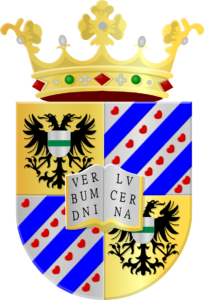 where he obtained his doctorate in jurisprudence in 1908. After this, he studied Indian Law for another year at the University of Leiden. He married at the end of December 1909 and in February 1910 he and his wife left for the Dutch East Indies, where he held various positions in both the sitting and the standing judiciary. He also worked from 1919 to 1925 as a civil servant at the disposal of the attorney general of the Supreme Court in Batavia and as a teacher at the police school in Buitenzorg for the training to become a police commissioner. In 1929 he was appointed civil servant for legislation at the department of justice in Batavia.
where he obtained his doctorate in jurisprudence in 1908. After this, he studied Indian Law for another year at the University of Leiden. He married at the end of December 1909 and in February 1910 he and his wife left for the Dutch East Indies, where he held various positions in both the sitting and the standing judiciary. He also worked from 1919 to 1925 as a civil servant at the disposal of the attorney general of the Supreme Court in Batavia and as a teacher at the police school in Buitenzorg for the training to become a police commissioner. In 1929 he was appointed civil servant for legislation at the department of justice in Batavia. 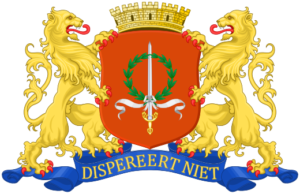 In the summer of that year he was granted a short leave to the Netherlands for a period of three months “for important reasons”. On 31-08-1929 of that year he was honourably discharged from the service of the East Indies.In the Netherlands he settled in Groningen. In September he was nominated for appointment as clerk at the court in Winschoten and later that year he was appointed deputy district judge in Groningen, after which he became a judge at the Groningen court
In the summer of that year he was granted a short leave to the Netherlands for a period of three months “for important reasons”. On 31-08-1929 of that year he was honourably discharged from the service of the East Indies.In the Netherlands he settled in Groningen. In September he was nominated for appointment as clerk at the court in Winschoten and later that year he was appointed deputy district judge in Groningen, after which he became a judge at the Groningen court  in early 1931.
in early 1931. 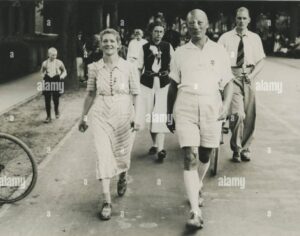 Jan Feitsma and his wife in 1937 during the Nijmegen Four Days Marches.
Jan Feitsma and his wife in 1937 during the Nijmegen Four Days Marches.
Feitsma was a member of the NSB  The National Socialist Movement in the Netherlands (NSB), which was organised in 1931 by the future leader Anton Adrian “AD” Mussert
The National Socialist Movement in the Netherlands (NSB), which was organised in 1931 by the future leader Anton Adrian “AD” Mussert




 and Cornelis “Cees” van Geelkerken.
and Cornelis “Cees” van Geelkerken.


 ,was a Dutch political party that existed from 1931 to 1945. The NSB adhered to the ideology of National Socialism, presented itself as a movement rather than a party, based on an anti-democratic attitude, and functioned as a collaboration party during the German occupation of the Netherlands in World War II.
,was a Dutch political party that existed from 1931 to 1945. The NSB adhered to the ideology of National Socialism, presented itself as a movement rather than a party, based on an anti-democratic attitude, and functioned as a collaboration party during the German occupation of the Netherlands in World War II.
He succeeded J.A. van Thiel 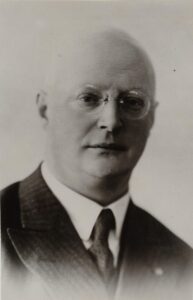 as Attorney General in Amsterdam at the end of 1941. His name was therefore on the signs that denied access to Jewish citizens in parts of Amsterdam. In September of that year, his younger brother Gerben Feitsma, who was also a member of the NSB, became mayor of the municipality of Kollumerland en Nieuwkruisland. On 01-03-1943, Feitsma became not only Attorney General but also acting police president of Amsterdam and regional police president for the region around Amsterdam. At the end of March, mayor Edward Voûte
as Attorney General in Amsterdam at the end of 1941. His name was therefore on the signs that denied access to Jewish citizens in parts of Amsterdam. In September of that year, his younger brother Gerben Feitsma, who was also a member of the NSB, became mayor of the municipality of Kollumerland en Nieuwkruisland. On 01-03-1943, Feitsma became not only Attorney General but also acting police president of Amsterdam and regional police president for the region around Amsterdam. At the end of March, mayor Edward Voûte  was also given the position of acting police president of Amsterdam. After the war, Gerben Fleisma (Kollum, 09-02-1887 – Kollum, 31-01-1953) was a Dutch farmer, administrator and collaborator during World War II. was imprisoned for 1.5 years for his assistance to Nazi Germany.
was also given the position of acting police president of Amsterdam. After the war, Gerben Fleisma (Kollum, 09-02-1887 – Kollum, 31-01-1953) was a Dutch farmer, administrator and collaborator during World War II. was imprisoned for 1.5 years for his assistance to Nazi Germany.
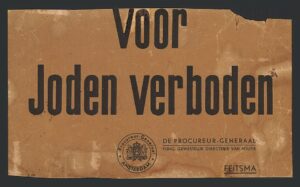 Note Banned for Jews signed by Feitsma as the Attorney General and acting regional director of police.
Note Banned for Jews signed by Feitsma as the Attorney General and acting regional director of police.
Death and burial ground of Feitsma, Jan Durks.
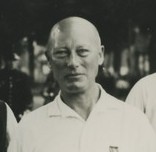

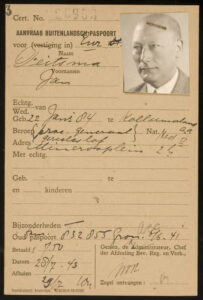
Early February 1943, the Jewish student Rudi Bloemgarten  tried to shoot Jan Feitsma dead, seriously injuring his son D.J. Feitsma. As a retaliation, 50 Amsterdammers were arrested and locked up in Camp Vught.
tried to shoot Jan Feitsma dead, seriously injuring his son D.J. Feitsma. As a retaliation, 50 Amsterdammers were arrested and locked up in Camp Vught.  Ten of them were soon released and the others at the end of July. On 02-02-1945, three months before the German capitulation, there was a new attempt by the resistance to kill him. On that day, 02-02-1945, age 61, Feitsma was shot dead by a cyclist on the street in Amsterdam on the corner of Jacob Obrechtstraat and Johannes Verhulststraat,
Ten of them were soon released and the others at the end of July. On 02-02-1945, three months before the German capitulation, there was a new attempt by the resistance to kill him. On that day, 02-02-1945, age 61, Feitsma was shot dead by a cyclist on the street in Amsterdam on the corner of Jacob Obrechtstraat and Johannes Verhulststraat, 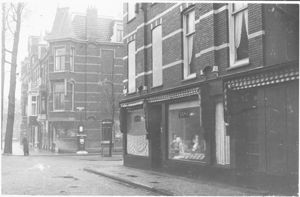 after which he died shortly afterwards at the age of 61.In retaliation for the attack, the Germans shot dead five Amsterdammers at the Rozenoord execution site on the Amsteldijk on 7 February, including two members of the judiciary:
after which he died shortly afterwards at the age of 61.In retaliation for the attack, the Germans shot dead five Amsterdammers at the Rozenoord execution site on the Amsteldijk on 7 February, including two members of the judiciary:
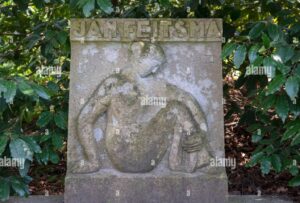

Message(s), tips or interesting graves for the webmaster: robhopmans@outlook.com
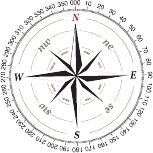















Leave a Reply